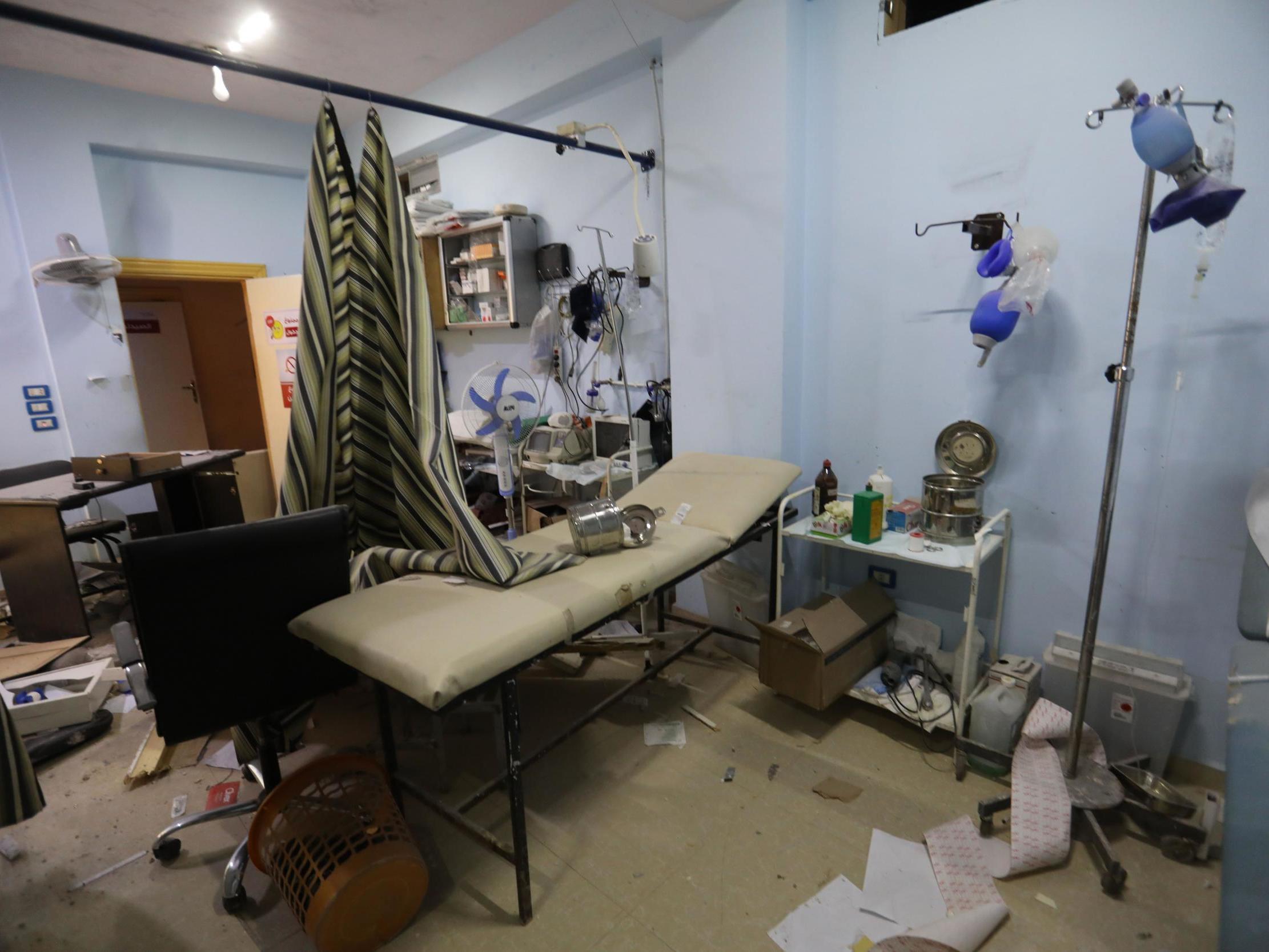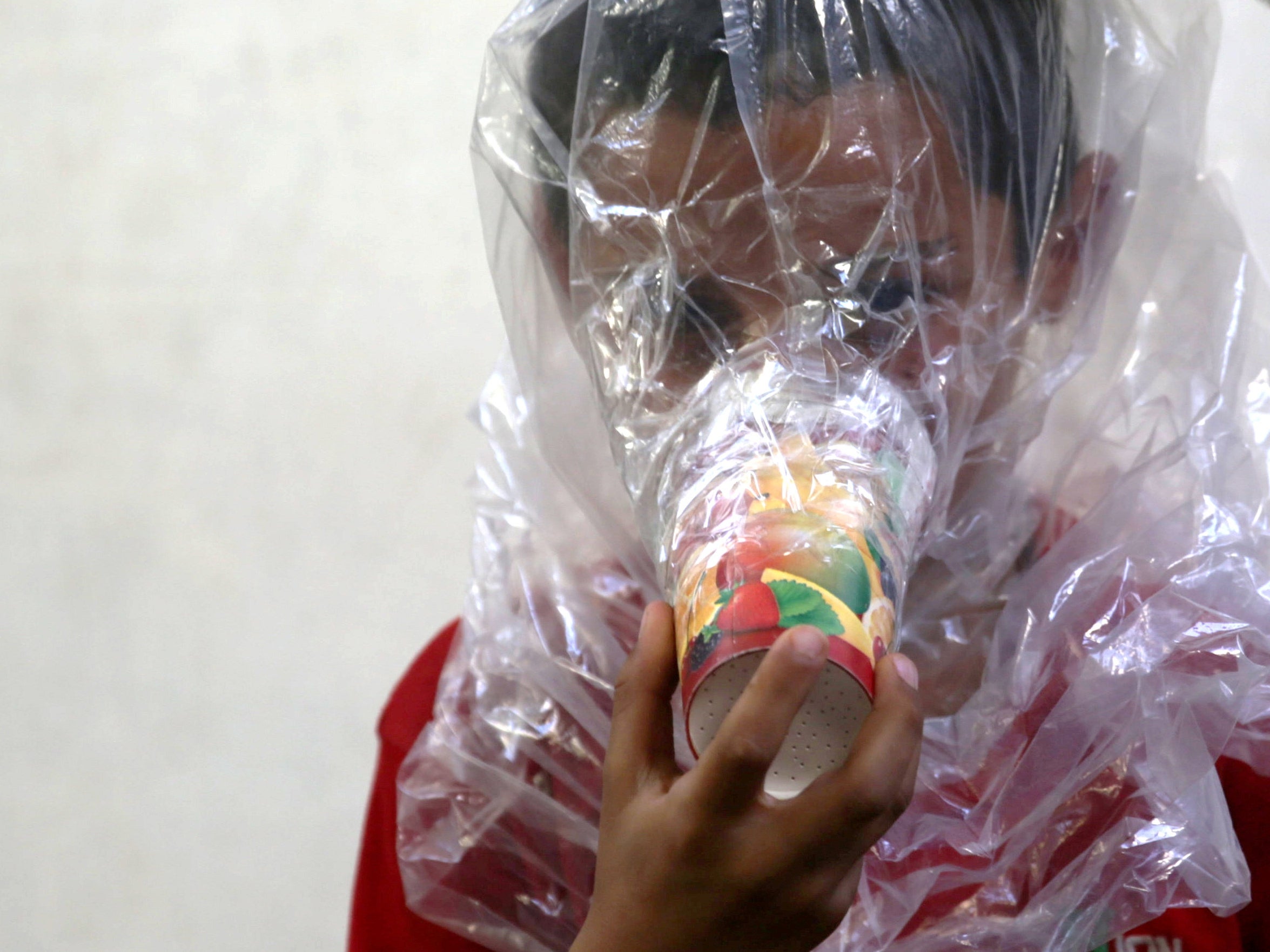At least four Syrian civilians killed as air strikes stepped up in rebel stronghold Idlib
Families make improvised gas masks for children and prepare bunkers in fear of chemical attack

Your support helps us to tell the story
From reproductive rights to climate change to Big Tech, The Independent is on the ground when the story is developing. Whether it's investigating the financials of Elon Musk's pro-Trump PAC or producing our latest documentary, 'The A Word', which shines a light on the American women fighting for reproductive rights, we know how important it is to parse out the facts from the messaging.
At such a critical moment in US history, we need reporters on the ground. Your donation allows us to keep sending journalists to speak to both sides of the story.
The Independent is trusted by Americans across the entire political spectrum. And unlike many other quality news outlets, we choose not to lock Americans out of our reporting and analysis with paywalls. We believe quality journalism should be available to everyone, paid for by those who can afford it.
Your support makes all the difference.At least four people have been killed in intensifying air strikes on Idlib, the last rebel bastion in Syria, monitoring groups have claimed, as families began to make improvised gas masks in fear of a chemical attack.
The Britain-based Syrian Observatory for Human Rights described the new bombardment by Syrian government and Russian forces as “the most intense” since last month when the southern edge of Idlib province started to come under attack.
The organisation recorded 68 air raids in which it said at least four civilians were killed, including two children and a woman.
As fears mount of chemical attacks, US military chiefs are drawing up options should President Bashar al-Assad again use chemical weapons on the population.
Civilians in Syria's remaining stronghold of active opposition to his rule have this week also been preparing for the worst, readying bunkers and children’s gas masks.
One father, Hudhayfa al-Shahad, used a colourful paper cup filled with cotton and charcoal to put over the face of one of his three children and tightened a plastic bag around his head as an improvised mask.
"We are preparing what little we can: small primitive masks we can place on our children's mouths in case we are hit with chemicals," 20-year-old Shahad said.
His brother, Ahmed Abdulkarim al-Shahad, 35, showed off a cavernous space under a courtyard the family has been sheltering.
"Military preparations as we have seen are in full swing... We have started preparing the caves," he said, showing glass bottles of pickled vegetables prepared in case the family are holed up.
Around 3 million people live in the rebel stronghold in northwest Syria, which comprises most of Idlib province and adjacent small parts of Latakia, Hama and Aleppo provinces.
The White Helmets, a team of rescuers, said it also recorded the four killed in Abdeen, a village west of Khan Sheikhoun. The rescuers said another person was killed in Halba, a village further north.
The group said one of its already damaged centres has been hit in the air strikes.

Meanwhile, America's top general said he was in "routine dialogue" with the White House about military options should Syria ignore US warnings against using chemical weapons.
Marine General Joseph Dunford, chairman of the Joint Chiefs of Staff, said no decision had been made by the US to employ military force. "But we are in a dialogue, a routine dialogue, with the president to make sure he knows where we are with regard to planning in the event that chemical weapons are used," he said.
He later added: "He expects us to have military options and we have provided updates to him on the development of those military options."
Washington has warned Mr Assad against using chemical weapons, promising a response if he does so.
The Assad regime has long been accused of using chemical weapons on civilians during the war. In April last year, a government warplane dropped sarin on Khan Sheikhoun, killing more than 80 civilians, the UN said. Investigators concluded that Syrian forces had used chemical weapons, including chlorine, more than two dozen times during the war.
Damascus and Russia deny this, saying they do not engage in chemical warfare.
The Trump administration also has little leverage to stop Russia, Iran and Syria pressing ahead with a massive military assault on Idlib province.
Three days ago Russian and Syrian fighter jets reportedly attacked two dozen locations.
It followed weeks of bombardment and shelling by pro-Syrian government forces.
"As for escaping towards the [Turkish] border, I don't believe we will move from our houses. The bombardment will get us. There is no place left after Idlib," said Ahmed al-Shahad.
"We will fight to the last man, we no longer have any option."
Additional reporting by agencies
Join our commenting forum
Join thought-provoking conversations, follow other Independent readers and see their replies
Comments